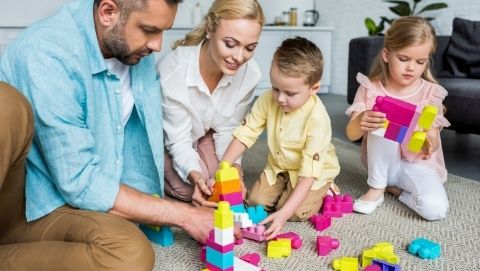Please give us feedback on one of our weekly question and answer articles. We value your time so the evaluation will only take 3 minutes or less, we promise!
Take the Survey »A Little Play Goes a Long Way: The Importance of Playing with Your Child
By Christina Pay, Extension Assistant Professor
Play is essential to a child’s healthy development. Play is so important to optimal child development that “it has been recognized by the United Nations High Commission for Human Rights as a right of every child” (Ginsburg, 2007). According to Dr. Michael Popkin, author of the Active Parenting series of parenting programs, playing with your child builds the child’s self-esteem, helps the child learn about the world, provides opportunities for the child to learn new skills, and builds the bond between parent and child (Popkin, 33).
Engaging fully with your child in play offers a wonderful opportunity to build your child’s self-esteem. Imagine how your child must feel, knowing that the most important person in their world likes them enough to take the time to play with them. Additionally, research shows when you allow the play to be child-directed, children benefit in a multitude of ways. They can move at their own pace, practice decision-making skills, and discover what their own areas of interest are. Research also tells us that child-directed play improves a child’s self-control, the way they handle their feelings, and how they feel about themselves. Alternately, when the play is controlled by adults, some of the benefits of play are lost, such as developing leadership and creativity skills (Ginsburg, 2007).
Brain development is strengthened by play. It is how children, at a very early age, engage with and interact with their world. As they explore and master challenges they build new competencies and skills which enhance confidence and builds resilience, both of which are needed to help them face future challenges in life. A child’s development is affected positively by consistent and loving relationships with parents as they interact through play. Quite simply, the bonds between parent and child are built and made stronger when playing together.
Playing with your child offers benefits to you, as well. Science has shown that when parents play with their child, the hormone, oxytocin, is released. Oxytocin is associated with trust and relationship building. Another benefit of oxytocin is that it counteracts the effects of stress, reducing blood pressure, anxiety, and fear (Dewar, 2019). Play is a win-win for both of you!
Try adding a little play each day with your child. Need ideas to get started? Begin by visiting these websites:
- For ages Birth to Three, At Home Activity Guide
- Early Childhood ages, At Home Activities for Parents and Young Children
- For all ages, Playing with Your Child .
References
- Dewar, G. (2019). Oxytocin affects social bonds and our responses to toxic stress. Can we influence oxytocin in children? Parenting Science. https://www.parentingscience.com/oxytocin-in-children-and-parents.htmlGinsburg, K. (2007). The importance of play in promoting healthy child development and maintaining strong parent-child bonds. Pediatrics, 119(1), 182–191. https://doi.org/https://doi.org/10.1542/peds.2006-2697
- Navarez, D. F. (2014). Why play with a child? Psychology Today. https://doi.org/
- Popkin, M. H. (2017). Chapter 1: Every Day a Little Play. In Active Parenting First Five Years (pp. 33–37). Active Parenting Publishers.

